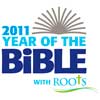To mark the 400th anniversary of the Authorised Version of the Bible in 1611, Malcolm Guite, an expert on the language of the period, has written a series of sermon notes on well-loved passages.
And the Word was made flesh
John 1.1-14
If the opening of Genesis puts us into the big picture of the whole creation and makes our little story part of that big story, then the opening of John’s Gospel puts us into an even bigger picture still, makes us part of an even bigger story; the story of God himself.
Though John’s Gospel comes after the Book of Genesis in the Bible, John’s ‘In the beginning’ really comes before the ‘In the beginning’ of Genesis! It comes before time and space, before the beginning of Creation, for John begins in God himself. He gives us, in the simplest possible words, a glimpse into the deepest possible mystery; the mystery of a God who is one and yet in whom there is communion, a God who is ‘with’ his Word and yet also is his Word, a God in whom and with whom there is meaning and purpose, ‘logos’, the Word. And John shows us a God who does not keep this meaning and purpose to himself but who communicates it, shines it out into his creation as a gift that is at once light and life, a light and life to be shared with all of us. The Word, the logos, who is incarnate as Jesus Christ, is in John’s Gospel ‘the true Light’, which, as this translation puts it ‘lighteth every man that cometh into the world’.
This is a wonderful and radical thing to say, and perhaps we have not yet grasped its full implications. Christians who are troubled at the thought that perhaps their faith involves diminishing or even excluding those who do not share it, who belong to other cultures or faiths or were born in all the centuries before the coming of Christ, would do well to reflect on this prologue. Here Christ is already a Words we have loved light and a life for all people even before they know his name or the glimpse the mystery of how he was ‘made flesh’. And the AV spells it out in words of one syllable!
‘In him was life and that life was the light of men.’
Indeed it is striking how deliberately simple the language is here. People sometimes think the Authorised Version is all about elaborate Latinate language. Nothing could be further from the truth. There is an extraordinary power in the build-up of phrases, sometimes whole sentences, comprised entirely of one syllable words, each word-sound coming like a single drop, or pulse, of meaning:
‘The word as with God and the word was God…’;
‘He was in the world and the world was made by him and the world knew him not…’
‘And the word was made flesh…’.
Living in an age known for its ornate language and love of verbal decoration, the translators could, if they wished, have gone for lots of polysyllabic flourishes, and loaded their translation with expansions and interpretations. This translation could have read:
‘And the Verbal Essence, or Essential Meaning, was proximate to the Deity and yet the aforesaid quintessential logos was also consubstantial with Deity itself, participating in the quiddity of the Divine being’!
And this is, of course, just the kind of abstract language we have ended up with in some of our creeds, and in a great deal of our theology. There may be some place for it there, some need for abstraction, but there is also great danger. For the incarnation (to use another abstract word – not used by John) is the opposite of abstraction! Incarnation is about God coming down from on high, getting stuck in, getting particular, dwelling with us, not abstracting away from us.
Sadly, we in the churches have sometimes tried to undo God’s simple presence, his choice to be ‘made flesh’, to be Emmanuel, God with us, and have even used words themselves to make the Word more distant. The Scottish poet Edwin Muir reflected on this reversal, or betrayal, of incarnation when he complained about the Calvinist Kirk of his childhood in his poem ‘The Incarnate One’ (Collected Poems, London, Faber 1960 p.228. He says, ‘There’s better Gospel in man’s natural tongue’, and it is just that ‘natural tongue’ which the King James Version translation achieves in its clarity and simplicity.
When ‘the Word was made flesh and dwelt amongst us full of grace and truth’, God himself achieved the greatest translation of all. He translated himself into the language of our own flesh and blood, he made himself present and available to us, right here where we are. It is that great translation of the Word into flesh which is the root of every fresh translation of the Scripture, every attempt to express the Gospel again in our ‘natural tongue’. In the course of these five articles I have been celebrating the continued power of the AV, over four hundred years, to do just that. But by the same token I welcome the fresh expressions, the new translations of each new generation, which are themselves continuing, under his inspiration, God’s great and continuous act of self-translation in Jesus Christ.
You are welcome to reproduce this article within your church or organisation.
Please ensure that the copyright line 'This resource is taken from www.rootsontheweb.com and is copyright © ROOTS for Churches Ltd 2011.' is included.
You can find out more about the Year of the Bible on the website www.2011trust.org.
 Go to index of all ROOTS
Go to index of all ROOTS
Year of the Bible 2011 material